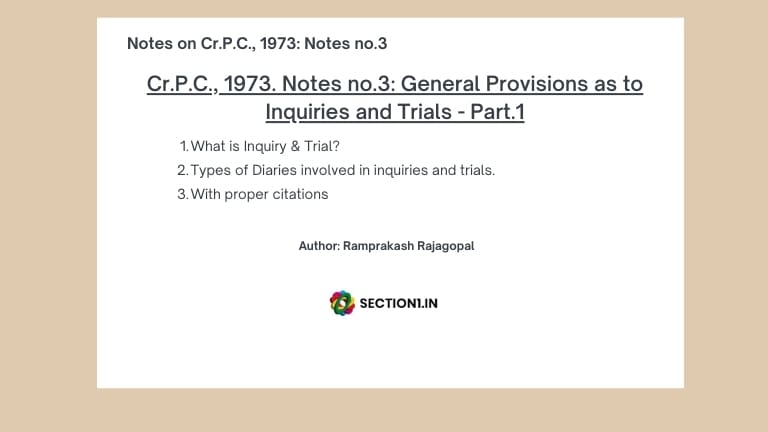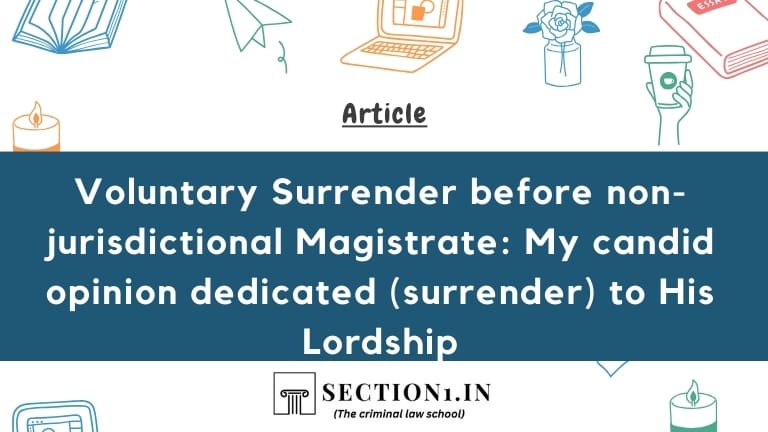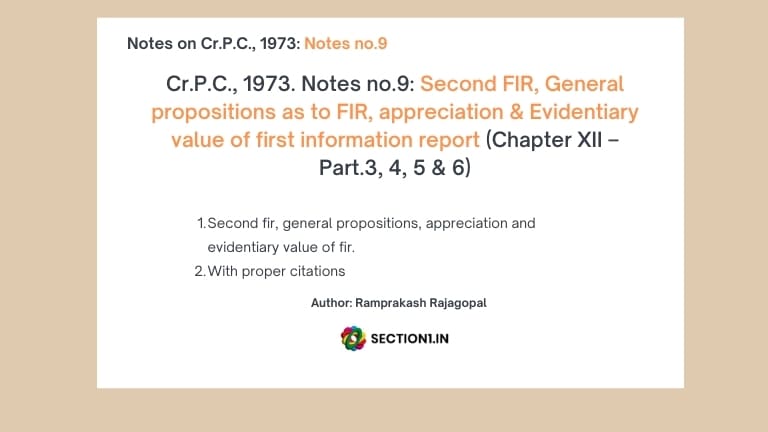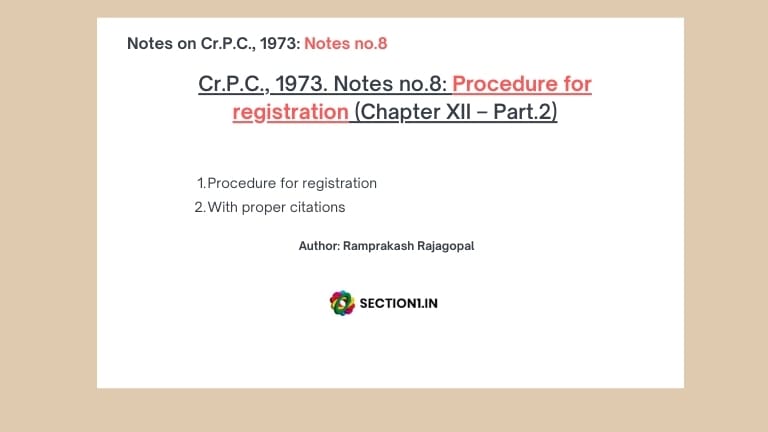Inquiry & Trial
The definition of the word ‘inquiry’ u/s – 2(g)[1] puts it beyond doubt that an ‘inquiry’ is something different from a ‘trial’ and that ‘inquiry’ stops when ‘trial’ begins[2]. The word ‘inquiry’ refers to proceedings up to the charge and the word ‘trial’ to those after the charge. The ‘trial’ of an accused person is said to begin when he is called up on to plead to a charge and a Magistrate’s proceeding before this stage is reached are in the nature of an ‘inquiry’[3]. It was held that in Criminal Jurisprudence as also in legal circles a distinction is generally recognised between ‘inquiry’ & ‘trial’. The word ‘trial’ has not been defined in the Cr.P.C 1973. But the very definition of ‘inquiry’ in S – 2(g) as ‘every enquiry other than a trial conducted under this code by a Magistrate or court’ goes to show that ‘trial’ is also recognised in Chap – XIX in complaint cases. The time spent in recording the pre – charge evidence which is usually recorded in complaint cases before the charge is framed will be not counted in ‘trial’ for purpose of S – 437 (6) Cr.P.C[4]. Even clear though the word ‘trial’ is not defined either in the code or in the Act (SC/ST (33of 1989)), it is clearly distinguishable from ‘inquiry’ is defined u/s. 2(g) of Cr.P.C as ‘every inquiry, other than trial, conducted under this code by a Magistrate or court’. So the trial is distinct from inquiry and inquiry must always be a forerunner to the trial[5].
The word ‘inquiry’ is not defined under the Code of Criminal Procedure which is an act of asking information and also consideration of some evidence, may be documentary. The expression ‘trial’ has not been defined in the Code of Criminal Procedure but must be understood as the examination by court of issues of fact and law in a case for the purpose of rendering the judgment relating to some offences committed[6].
Author’s note: “enquiry or inquiry” – Kindly note that there is no settled proposition that ‘enquiry’ is different from ‘inquiry’. There are many stories or misunderstandings that these words are totally different and ‘enquiry’ belongs to ‘police officers’. This is totally a misconception, inasmuch as Code does not define ‘enquiry’ and the Code did not assign the word ‘enquiry’ to police officers ‘only’. Enquiry had been used as one of the powers of the Magistrates, for instance section 210 Cr.P.C has used both the phrases ‘inquiry’ and ‘enquiry’[7]. In Section 210 Cr.P.C the enquiry denotes the proceedings started under chapter XV and XVI of the Code. What is meant for Police is ‘investigation’ and not ‘investigation’ only but preliminary inquiry also. Even the phrase ‘preliminary inquiry’ was used by the constitution bench Lalita Kumari vs. Govt. of U.P. and Ors [(12.11.2013 – SC) – AIR 2014 SC 187 – 5 Judge Bench] which is as follows:
“120.2. If the information received does not disclose a cognizable offence but indicates the necessity for an inquiry, a preliminary inquiry may be conducted only to ascertain whether cognizable offence is disclosed or not”.
But the Investigation Officer has not right to make any ‘enquiry’ or ‘inquiry’ or ‘investigation’ in terms of section 17A Prevention of Corruption Act, 1988. Do not forget that in this section the term ‘enquiry’ has been recognized as one of the powers of the Investigation Officers.
[section 17A[8]. Enquiry or Inquiry or investigation of offences relatable to recommendations made or decision taken by public servant in discharge of official functions or duties. – (1) No police officer shall conduct any enquiry or inquiry or investigation into any offence alleged to have been committed by a public servant under this Act, where the alleged offence is relatable to any recommendation made or decision taken by such public servant in discharge of his official functions or duties, without the previous approval-
(a) in the case of a person who is or was employed, at the time when the offence was alleged to have been committed, in connection with the affairs of the Union, of that Government;
(b) in the case of a person who is or was employed, at the time when the offence was alleged to have been committed, in connection with the affairs of a State, of that Government;
(c) in the case of any other person, of the authority competent to remove him from his office, at the time when the offence was alleged to have been committed:
Provided that no such approval shall be necessary for cases involving arrest of a person on the spot on the charge of accepting or attempting to accept any undue advantage for himself or for any other person:
Provided further that the concerned authority shall convey its decision under this section within a period of three months, which may, for reasons to be recorded in writing by such authority, be extended by a further period of one month.]
With these examples I personally expect the legal fraternities not to frame any wrong ideas without finding the same otherwise engaged in the Code or in any judgments.
Diaries used in criminal proceedings
General Diary – Trial
Section 44[9]. Police officers to keep diary .It shall be the duty of every officer in charge of a police station to keep a general diary in such form shall, from time to time, be prescribed by the State Government and to record therein all complaints and charges preferred, the names of all persons arrested, the names of the complainants, the offences charged against them, the weapons or property that shall have been taken from their possession or otherwise, and the names of the witnesses who shall have been examined.
The Magistrate of the district shall be at liberty to call for and inspect such diary.
As the concept of maintaining General Diary has its origin under the section 44 of Police Act of 1861 as applicable to States, which makes it an obligation for the concerned Police Officer to maintain a General Diary, but such non-maintenance per se may not be rendering the whole prosecution illegal. However, on the other hand, we are aware of the fact that such non-maintenance of General Diary may have consequences on the merits of the case, which is a matter of trial. Moreover, we are also aware of the fact that the explanation of the genesis of a criminal case, in some cases, plays an important role in establishing the prosecution’s case[10].
General diary: Defence can summon
No doubt daily diary is a document which is in constant use in police station. But no prosecution is expected to produce such diaries as a matter of course in every prosecution case for supporting the police version. If such diaries are to be produced by prosecution as a matter of course in every case the function of the police station would be greatly imposed. It is neither desirable nor feasible for the prosecution to produce such diaries in all cases. Of course, it is open to the defence to move the court for getting down such diaries if the defence wants to make use of it[11].
As is well known entries are made in the General diary about all the events that take place in the police station in chronological order and it is ordinarily difficult to fabricate false entries in the General diary[12].
Special diary: General diary
The expression ‘diary’ referred to in Section 167(1) of the Code is the special diary mentioned in Section 167(2) which should contain full and unabridged statements of persons examined by the police so as to give the Magistrates on a perusal of the said diary, a satisfactory and complete source of information which would enable him to decide whether or not the accused person should be detained in custody but it is different from the general diary maintained u/s 44 of the Police Act[13]. [In my view, the Apex Court has been teaching the police authorities to maintain a diary ‘specially’ for custody purpose and keep it with the ‘case diary’. Because, as per section 172(2) cr.p.c the court can only call for case diaries when inquiry or trial is started and not before that. Hence, the stage of section 167 cr.p.c is neither an inquiry nor trial but of investigation and hence the diary engrafted u/s 167 cr.p.c is not case diary as stated u/s 172 cr.p.c]
Section 172 Cr.P.C: Case diary: Object
Section. 172:[14] Diary of proceedings in investigation. – (1) Every police officer making an investigation under this Chapter shall day by day enter his proceedings in the investigation in a diary, setting forth the time at which the information reached him, the time at which he began and closed his investigation, the place or places visited by him, and statement of the circumstances ascertained through his investigation.
[(1-A) The statements of witnesses recorded during the course of investigation under Section 161 shall be inserted in the case diary.
(1-B) The diary referred to in sub-section (1) shall be a volume and duly paginated.]
(2) Any Criminal Court may send for the police diaries of a case under inquiry or trial in such Court, and may use such diaries, not as evidence in the case, but to aid it in such inquiry or trial.
(3) Neither the accused nor his agents shall be entitled to call for such diaries, nor shall he or they be entitled to see them merely because they are referred to by the Court; but, if they are used by the police officer who made them to refresh his memory, or if the court uses them for the purpose of contradicting such police officer, the provisions of section 161 or section 145, as the case may be, of the Indian Evidence Act, 1872 (1 of 1872), shall apply.
Lastly, we may point out that in the present case, we have noticed that the entire case diary maintained by the police was made available to the accused. u/s 172 of the Criminal Procedure Code, every police officer making an investigation has to record his proceedings in a diary setting forth the time at which the information reached him, the time at which he began and closed his investigation, the place or places visited by him and a statement of the circumstances ascertained through his investigation. It is specifically provided in Sub-clause (3) of Section 172 that neither the accused nor his agents shall be entitled to call for such diaries nor shall he or they be entitled to see them merely because they are referred to by the Court, but if they are used by the police officer who made them to refresh his memory, or if the Court uses them for the purpose of contradicting such police officer, the provisions of Section 161 of the Cr.P.C. or the provisions of Section 145 of the Evidence Act shall be compiled with. The Court is empowered to call for such diaries not to use it as evidence but to use it as aid to find out anything that happened during the investigation of the crime. These provisions have been incorporated in the Code of Criminal Procedure to achieve certain specific objectives. The police officer who is conducting the investigation may come across series of information which cannot be divulged to the accused. He is bound to record such facts in the case diary. But if the entire case diary is made available to the accused, it may cause serious prejudice to others and even affect the safety and security of those who may have given statements to the police. The confidentiality is always kept in the matter of criminal investigation and it is not desirable to make available the entire case diary to the accused. In the instant case, we have noticed that the entire case diary was given to the accused and the investigating officer was extensively cross-examined on many facts which were not very much relevant for the purpose of the case. The learned Sessions Judge should have been careful in seeing that the trial of the case was conducted in accordance with the provisions of the Cr. P.C[15].
Section 172 Cr.P.C: Judge how to use case diary?
A reading of the said sub-section makes the position clear that the discretion given to the court to use such diaries is only for aiding the court to decide on a point. It is made abundantly clear in sub-section (2) itself that the court is forbidden from using the entries of such diaries as evidence. What cannot be used as evidence against the accused cannot be used in any other manner against him. If the court uses the entries in a case diary for contradicting a police officer it should be done only in the manner provided in section 145 of the Evidence Act i.e, by giving the author of the statement an opportunity to explain the contradiction, after his attention is called to that part of the statement which is intended to be so used for contradiction. In other words, the power conferred on the court for perusal for the diary under section 172 of the Code is not intended for explaining a contradiction which the defence has winched to the fore through the channel permitted by law. The interdict contained in section 162 of the code, debars the court from using the power u/s 172 of the Code for the purpose of explaining the contradiction[16].
A criminal court can use the case diary in the aid of any inquiry or trial but not as an evidence. This position is made clear by Section 172(2) of the Code. Section 172(3) places restrictions upon the use of case diary by providing that accused has no right to call for the case diary but if it is used by the police officer who made the entries for refreshing his memory or if the Court uses it for the purpose of contradicting such police officer, it will be so done in the manner provided in Section 161 of the Code and Section 145 of the Evidence Act. Court’s power to consider the case diary is not unfettered. In light of the inhibitions contained in Section 172(2), it is not open to the Court to place reliance on the case diary as a piece of evidence directly or indirectly[17].
Citations
[1] Section 2(g) “inquiry” means every inquiry, other than a trial, conducted under this Code by a Magistrate or Court [CHAPTER I – Preliminary – section 2: Definitions].
[2] Nageshwar Singh Vs. State of Assam – 1974 Cr.L.J 193
[3] Sriramulu V.K Narayana Swami Naiki Vs. Emperor 32 M 220 (234)
[4] Robert Lendi Vs. Collector of Customs 1987 Cr.L.J 55; 1986 (3) Crimes 54
[5] Gangula Ashok & another vs. State of A.P 2000 Cr.L.J 819 (SC)
[6] Ashwani Kumar Saxena vs. State of M.P – (2013)1 SCC (Cri) 594=(2012)9 SCC 750
[7] Section 210 Cr.P.C: …… the Magistrate shall stay the proceedings of such enquiry or trial and call for a report on the matter from the police officer conducting the investigation.
[8] The Prevention of Corruption (Amendment) Act, 2018 (hereinafter referred to as ‘2018 Act’ for short) was brought into force on 26.07.2018.
[9] The Police Act, 1861 (5 of 1861).
[10] STATE BY LOKAYUKTHA POLICE vs H. SRINIVAS – (2018) 7 SCALE 649=(2018) 7 SCC 572=(2018) 3 SCC(Cri) 267.
[11] Kalpnath Rai v. State – AIR 1998 SC 201=1997 AIR SCW 4166 – Going against this Hon’ble Apex Court judgment and, without even citing the same, the Hon’ble Madras High Court in Haji Mohammed and Others v. the State rep. By the Inspector of Police, Koradacheri P.S., Thiruvarur District reported in 2018 (2) LW Criminal 853, has held that the General Diary also falls within the scope of Section 172 of Cr.P.C. and the same cannot be called for in evidence. But the abovesaid Madras single judge judgment got overruled in P.Kalaiselvam VS State rep.by Inspector of Police, Melapalayam Police Station, Tirunelveli District – Crl Apl. (Md)Nos. 262 of 2013 – dt: 07-03-2019 – 2019 2 LW (Cri) 161=2019 0 Supreme(Mad) 2132. Hence, the current position is the defence may summon the General diary.
[12] AIR 1978 SC 1506 – Sadher Singh v. State of U.P [Bench of 3 Judges]
[13] DIRECTORATE OF ENFORCEMENT — vs DEEPAK MAHAJAN AND ANOTHER – (1994) 1 SCALE 294=(1994) 3 SCC 440 : (1994) SCC(Cri) 785.
[14] Cr.P.C., 1973 – CHAPTER XII – Information To The Police And Their Powers To Investigate
[15] SIDHARTH vs STATE OF BIHAR – (2005) Cri.L.J 4499 (SC)=(2005) 7 SCALE 700=(2005) 12 SCC 545=(2006) 1 SCC(Cri) 175.
[16] Mahabir Singh e.t.c vs. State of Haryana – 2001(3) CTC 504 (SC)
[17] Md. Ankoos and Others Vs The Public Prosecutor, High Court Of A.P – (2009) 13 SCALE 584 : (2010) 1 SCC 94 : (2010) 1 SCC(Cri) 460 : (2009) 15 SCR 616 : (2009) 7 Supreme 231.
Further study
Cr.P.C., 1973. Notes no.1: Understanding the Police Report, Investigation, and Court’s Duties in Criminal Cases
Cr.P.C., 1973. Notes no.2: A General Introduction (with powers of police)






